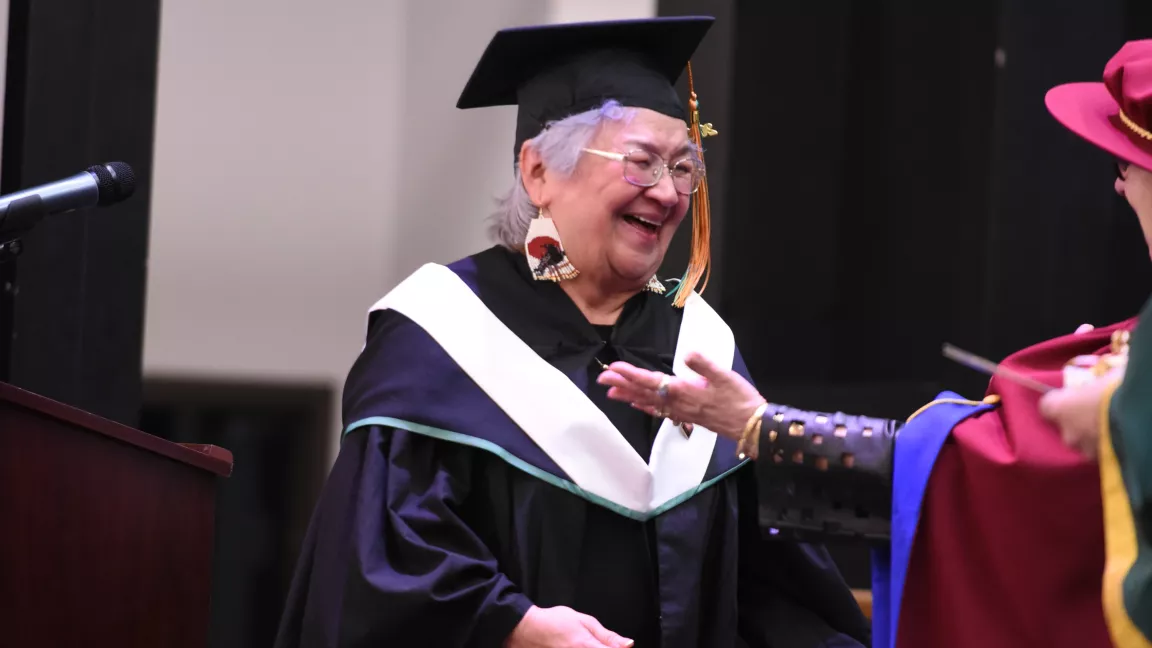The power of example
Modelling for others her belief in the importance of education, Julia Adams passionately pursued two degrees in her home community in the Nass Valley as a way to deepen her understanding and further connect to Nisga'a culture and traditions.

Her research captured the importance of the grandmother’s teaching, but the path she’s laid for others to follow is a powerful example of those lessons in action.
Nisga’a Elder Julia Adams is the first Matriarch in the Nass Valley to receive a master’s degree from the Wilp Wilxo’oskwhl Nisga’a Institute (WWN) and UNBC, since the institute began offering post-secondary opportunities to residents in northwestern B.C. through a federated agreement in 1993.
The 77-year-old graduated with a Master of Arts in First Nations Studies as WWN hosted its 30th graduation ceremony in the Village of Gitwinksihlkw at the end of May.
Adams was a Community Health Representative in the region for 32 years, trained to deliver first aid and basic health care services. During her career, she left her community to obtain a Human Service Worker Certificate at Northwest Community College (now Coast Mountain College) in Terrace.
“After I graduated with my certificate, I wanted to continue studying,” she says. “I speak the Nisga’a language fluently and I was raised with the Nisga’a culture, but I wanted to learn to read and write the language, so I registered for WWN’s Nisga’a Language and Culture programs.”
Adams says having access to post-secondary education in her home community was crucial to her continued pursuit of knowledge. “The move to Terrace was really tough on my family,” she says. “I had to find affordable accommodations, find a suitable school for my children and help them adapt to the new environment.”
As an undergraduate, Adams continued to work full-time, while pursuing her Bachelor of Arts in First Nations Studies at WWN. She received her bachelor’s degree in 2001.
“I think it’s important to learn and study right in the Nass Valley because a lot of our courses in both the BA and the MA relate back to the lands: the plants, the salmon, the wildlife,” says the member of the Raven Clan. “In researching the role of the Nisga’a woman, I was able to interview the Elders, the Matriarchs and the Chiefs, so I heard again verbally what I was studying in books.”
With the teachings of the grandmothers suppressed by the colonial disruptions that included church interference and residential schools, Adams is hopeful her research will help to connect young people to their culture and traditions, as the Nisga’a Nation continues to move forward.
“I think it’s important for young women especially because things are changing in a positive way,” says the Matriarch. “We have the university, we have the government and I think it’s important for our people to have their education to be able to do their jobs and still follow the culture and the traditions that our grandmothers taught us.”
Last year, WWN saw its oldest student graduate. The late Hubert Haldane was 80-years-old when he received his Bachelor of Arts in First Nations Studies. “I was really impressed that he had his BA when he passed away. It’s another really good example for seniors to go back to school and learn the academic part of life,” says Adams. “We know our culture, we know our language, but we need to enhance that, too.”
When asked about the influence her achievements may have on young people, Adams says, “I think it’s important because it shows that learning never stops. You may have bumps along the road that slow you down, but you get back up and begin again.”